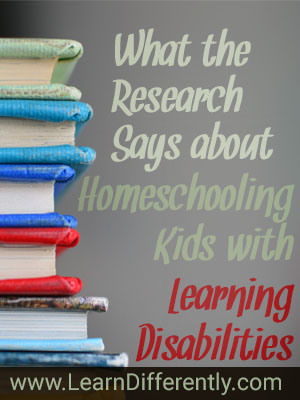What the Research Says about Homeschooling Kids with Learning Disabilities

By Kathy Kuhl If you homeschool a child with learning differences, you’ve probably been told it’s a bad idea. “You don’t have the training.” “Leave it to the experts.” Some of you even have spouses or ex-spouses who object to your homeschooling.
But there is reputable research to support the choice to homeschool students with learning disabilities. Last month I had the privilege of meeting Dr. Steven Duvall and Dr. Brian Ray, leaders in the field of homeschool research.

Dr. Duvall researches the homeschooling of students with learning disabilities. He heads the school psychology program at Pittsburg State University in Kansas. I quoted his work in Homeschooling Your Struggling Learner. Recently, he graciously forwarded me a list of more recent articles he thought would be most helpful to you.
Dr. Ray heads the National Home Education Research Institute. He researches many aspects of homeschooling, not just the special needs aspect. I recommend subscribing to NHERI’s newsletter. It’s the best way to keep up with current research into home education.
Using Research to Help Others See the Value of Homeschooling
The bibliography below can help you show others that homeschooling can be better for your child. Homeschool can provide your child with more opportunities to stay engaged. These research articles can help you defend your decision to homeschool–but remember, that’s just one part of making your case.
But caring for and educating children is an emotional issue. Your relatives’ concerns about homeschooling likely come out of a deep concern for the child—and for you. Mere facts may not change their minds. For more on what to do when family objects to homeschooling, see this post. Also, be sure to subscribe to my blog or my newsletter.
How Researchers Measure Effectiveness
To measure the effectiveness of homeschooling–or any teaching approach–you need to decide what to measure. Education researchers have found that active academic responses correlate with academic gains. “Active academic responses” (AAR) are actions students take in response to instruction. Examples include writing, speaking, or drawing.
In plain English, kids who participate while be taught by writing, creating, or speaking are more likely to improve their standardized test scores. It makes sense then that a homeschooling parent can engage the student more frequently than a classroom teacher with thirty students. This is one reason homeschooling works for so many different kinds of students.
So counting AAR is a good way to measure the effectiveness of any teaching method, including homeschooling. Using a standardized method, researchers count the AAR while observing teachers or homeschoolers teaching. Understanding this technique helps us understand the research.
[Like any measure, this one has limits. For example, from an AAR standpoint, read-aloud time gets a poor score. But reading aloud can change children forever. When my fourth grader teacher, Mrs. Hepner, read us The House of Sixty Fathers by Meindert DeJong, my active academic response was zero. I just sat.
But like any good literature, however, this book broadened my horizons. Gently, DeJong took us along the road with a lonely young Chinese war refugee in 1942. I’ve never thought the same way about refugees since.
My point? While we want to keep our kids engaged and active, remember that some important engagement may be beyond measuring.]
Research recommended by Dr. Steven Duvall
- Duvall. S. F. (2005). The effectiveness of homeschooling students with special needs. In B.S. Cooper (Ed.), Homeschooling in full view, a reader (pp. 151-165). Greenwich, Connecticut: Information Age Publishing.
- Duvall, S.F. (2016). Are homeschools adequate learning environments for students with LD? In B.S. Cooper, F.R. Spielhagen, and C. Ricci (Eds.), Homeschooling in new view: second edition (95-110). Charlotte, North Carolina: Information Age Publishing.
- Duvall, S.F. (2011). Assessing homeschool students, Communique´, 40(4), 22-23.
- Duvall, S. F., Delquadri, J.C., Elliott, M., & Hall, R.V. (1992). Parent tutoring procedures: Experimental analysis and validation of generalization in oral reading across materials, settings, and time. Journal of Behavioral Education, 2(3), 281-303.
- Duvall, S.F., Delquadri, J. C., & Hall, R.V. (2001). ParaProfessionals As Reading Tutors. Cambium Learning Company, Dallas, TX.
- Duvall, S., Delquadri, J., & Ward, D. (2004). A Preliminary Study Involving the Effectiveness of Homeschool Instructional Environments for Students with Attention-Deficit/Hyperactivity Disorder, School Psychology Review, 33(1), 140-158.
- Duvall, S., Ward, D., Delquadri, J., & Greenwood, C. (1997). An exploratory study of homeschool instructional environments and their effects on the basic skills of students with learning disabilities. Education and Treatment of Children, 20(2), 150-172.
Research recommended by Dr. Brian Ray
Dr. Ray of the National Home Education Research Institute, NHERI, generously provided this bibliography to SPED Homeschool. Its founder, Peggy Ployhar, graciously shared them with me.
- Dahm, Leslie. (1996, October). Education at home, with help from school. Educational Leadership, 54 (2), 68-71.
- Home Schooling Children With Special Needs: A Descriptive Study (Ray 2002)
- How many students with disabilities receive services? U.S. Department of Education data: National Center for Education Statistics
- RESEARCH FACTS ON HOMESCHOOLING (Ray 2018)
- Explaining the Change in Homeschooling, 1970-2010 (Ray 2013)
- An Exploratory Study of U.S. Pre-Service Teachers’ Beliefs About Homeschooling Outcomes (Ray 2012)
- Chris Klicka experienced special needs two ways. He is dad to a child with congenital disabilities. Later he developed multiple sclerosis. As a homeschooling dad and lawyer for the Home School Legal Defense Association, Mr. Klicka’s article combines legal expertise with compassion and insight. “Homeschooling and Special Needs Children” (2009)
Your thoughts
What research have you found helpful to make the case for homeschooling children who learn differently? Please answer in the comments section below.

